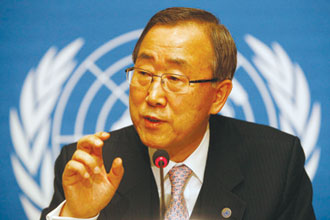
|
 |
 |
|
|
|
|
|
|
|
|
|
|
|
|
|
|
|
|
|
|
|
|
|
|
No Democracy through ViolenceTwo international observances of particular importance at the international and regional levels have been celebrated. The first occasion is the International Day of Non-Violence; the second, the International Day of Democracy. Both occasions are organically linked in their final goal, namely the creation of peacefully coexisting democratic communities that are free from violence, exclusion, extremism, dictatorship, discrimination, and deprivation of citizens’ rights.
Practical experience in the so-called ‘Arab Spring countries’ has demonstrated that violence contrasts with democracy, irrespective of whether violence is practiced by the regime or the opposition. It is difficult to build a sound, humane, fraternal and democratically coexisting system through civil wars, or through the barrel of a gun used against existing political regimes. Perhaps we do not need further explanation, as we witness the experiences of Libya, Syria and Iraq, where the much sought-after democracy was lost. Instead of democracy, violence settled and killing has become so widespread to the extent that the fundamental ‘right to life’ was lost, and communities splintered along regional, tribal, sectarian and ethnic lines fighting each other. Marking the occasion of the International Day of Non-Violence, Ban Ki-moon, the UN Secretary General wrote about the culture of non-violence as a path towards coexistence and prosperity of diversity. In this regard, Ban Ki-moon recalled Gandhi’s words: “An eye for an eye ends up making the whole world blind.” This is particularly true in cases of internal conflicts and civil wars where mutual retaliation is exercised between different groups, or between regimes and opponents. Mr Ban Ki-moon stressed that “We have to foster a culture of peace, built on dialogue and understanding, for living together in harmony while respecting and celebrating humanity’s rich diversity.” Moon also considered education as the most important tool “to enhance human dignity, promote a culture of non-violence, and build lasting peace. Through education, we can craft new ways of living” as well as “developing new forms of global citizenship and solidarity that are so essential in today’s world”. The United Nations Secretary General called on all people to counter what he called ‘the forces of intolerance’, which he believes to be the fundamental generator of violence. Such forces reject the primary principles of accepting differences, and refuse to co-exist with those who are different even among their compatriots. That is because these forces, owing to their fanaticism, determine rights on the basis of narrow affiliations. Fanatics reject equality and the principles of citizenship, and believe that they have more rights than their other compatriots, that is assuming, of course, they recognize that the latter have any rights in the first place, including such rights as the right to difference, and freedom of expression, thought and worship. Moreover, we even got to the point where the forces of bigotry and excommunication (such as ISIS) fail to recognize even the right to life for their opponents. We in Bahrain need to reaffirm the consolidation of a culture of non-violence, both in daily life and political life. No one should rush to justify violence, whatever is its source. We must all recognize that change through violence is not only expensive, with slim prospects of success, but it also eliminates the chances of a good life in the future and destroys the very foundations of community coexistence. Those who believe in violence as a means of achieving democracy should rest assured that this can never happen. What would happen, though, is that we will end up with the dismembered human corpses, dead consciences and warring communities that lack the most basic of requirements for a decent life. On the other hand, the roots of violence or the environment providing the climate for exercising it must all be wiped out or at least have their threat lessened. Violence grows in an environment of tyranny, despair of change, predominance of the culture of hatred and extremism, lack of respect for others and the adoption of means of coercion, exclusion and marginalization. All this leads to tendencies of violence in communities. We are required to expel the specter of violence from our society, through the reinforcement of democratic procedures and legislation and the rebuilding of the social fabric along the principles of citizenship; and through tolerance rather than punishment and by halting mutual retaliatory confrontations and planting the flowers of hope in a decent living in coexistence. In an article on the occasion of the International Day of Democracy, Mr Ban Ki-moon expressed his belief that the acts of violence which are raging, mostly in our region, consolidate the fact that “where societies are not inclusive, and where governments are not responsive and accountable, peace, equality and shared prosperity cannot take hold”. Thus he advocates the empowerment of the underprivileged, marginalized, miserable, jobless and hopeless people, so that they could engage in a positive manner in drawing their future. The UN Secretary General called on the youths aged between 15 and 24, who comprise one-fifth of the world population, to identify the challenges and the means of confronting and resolving them so that they can take control of their destiny, fulfill their dreams and lead the ranks in contributing to the building of stronger and better democratic societies. |
